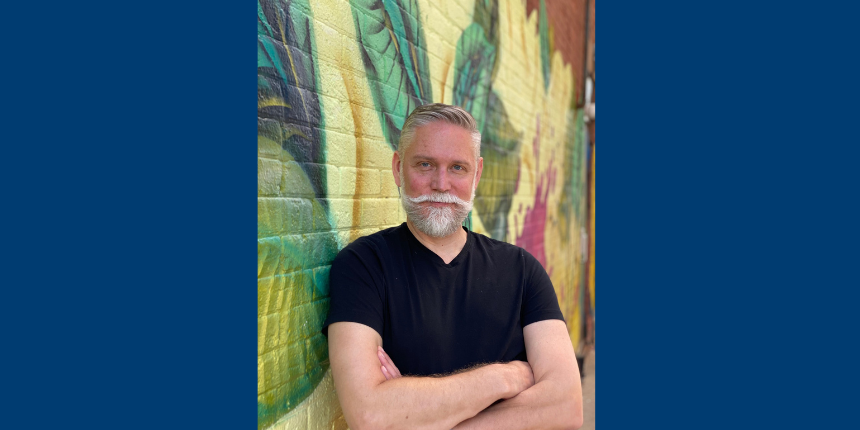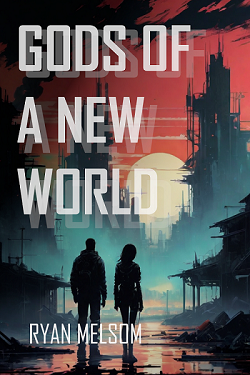

The Engineers Canada team brings a wide range of experiences and passions to their work. In this edition of Behind the Scenes at Engineers Canada, we’re spotlighting Ryan Melsom, Manager, Qualifications and Candian Engineering Qualifications Board Secretary. Beyond his role ensuring consistency in licensure practices across the country, he is also an author. His recent book, Gods of a New World, explores threats and potential of emerging technologies – bringing together his professional expertise and personal curiosity.

Can you tell us a little about the book?
It’s called Gods of a New World, and it’s available through all major booksellers, and an increasing number of independent ones.
The book itself is a cyberpunk thriller set in a near future where trillionaires have become all but indistinguishable from the ancient gods of myth. Through their data empires, they can see everything. Through their unlimited wealth, they can build anything. And through hyper-intelligent artificial intelligence, they can solve any problem they wish. They’ve won every game, and now they have a new plan: they want to fuse their consciousness into matter itself, and thereby gain the power to manipulate the world’s matter by will alone.
Two unlikely heroes, James Kessler and Maree Shell, stumble upon the trillionaire gods’ plan, and have to decide what, if anything, can be done. In the process they encounter a ragtag group of allies who rally to their cause. It’s got a lot of humor and action in it, and it plays with one of my favourite themes: slightly damaged everyday people going up against absolutely overwhelming forces. I like slim odds.
What first sparked the idea for your book and what made you decide to finally start writing?
The idea for the book kind of assembled itself from different interests over a couple of years. First, I had messed around with the idea of creating a modern-day pantheon made up of giant forces like Amazon and the Environment and the EU, but while it was fun, the idea didn’t really go anywhere. Another idea I’d played around with was the question of what a cyberpunk story would look like if it was set in the suburbs (Typically, this genre takes place in the guts and grime of a city). Then in 2023, there was the LLM explosion that kicked off with ChatGPT, and suddenly I had a pathway for how my modern-day “gods” idea could actually come to be. If you keep pushing this technology far enough (without regulation and accessibility), it’s not hard to imagine something like the world I portray in the book.
So, these different threads combined, I found a method to write the book, and I was cooking.
Who do you think will connect most with your book?
I think people who geek out on the threats and potential of technology will really enjoy it, but it’s also very human focused, so I think there are a lot of ways into the story for a lot of different people.
Anyone who doesn’t want to think about an AI-shaped, highly unequal world that’s coming to pass at an alarming rate should probably stay away :)
Do you see any connections between the themes in your book and the values or challenges within the engineering profession?
Holy smokes do I ever. Among other things, I’m actually helping the Canadian Engineering Qualifications Board write a Guideline on the ethical development and use of groundbreaking technology at the moment. My book could be seen as the evil twin of this guideline: the unethical development and use of groundbreaking technology. I’m not sure which is research for which anymore, to be honest.
Another important and highly relevant theme is the question of bias and inclusivity in the engineering design process and the profession more generally. Without giving away too many spoilers, I will say that any weaknesses in the hyper-powerful artificial intelligences have to do with things that they can’t (i.e. have not been trained or developed to) see. Future trillionaires be warned. . .
Are there any skills from your work at Engineers Canada that helped you through the writing and publishing process?
I work with diverse, highly intelligent people across the country, and I constantly have to try and facilitate balance and alignment among a huge number of perspectives. Relationships and collaboration are critical to this, and to my mind they always come first before any success. So, I guess my experience navigating these complex interpersonal dynamics allowed me to deepen the dynamics among many characters in the novel. While the story is driven by James and Maree, every single one of the diverse cast of characters is important to the bigger picture.
At work, I often leverage my highly lateral thinking style when solving problems, and this also plays into the novel. In both my work and for the characters Gods of a New World, it is sometimes the least obvious approach that ends up cracking the solution wide open.
What has been the most rewarding part of writing the book and the most challenging?
In terms of rewards, I honestly just love the process. I love pulling a wild, incongruous mishmash of ideas together from all over the place and synthesizing them into a plausible world. I love imagining places that feel alive, where you can feel what it would be like to walk through them. I love finding just the right words to realize the non-verbal vision that’s in my head. On that note, when I penned Engineers Canada’s vision “Advancing Canadian engineering through national collaboration”, it was a surprisingly similar process. It’s about finding an intuitive connection among disparate elements that resonates for others.
As for challenges, I think my biggest challenge is being patient. I finished the first draft of this book in June 2023, and it took over two years to get it from there to the official release on July 29th of this year. I think I want things to be done as soon as I have a clear picture of them, but there are so many steps you have to go through. When I’m at my best, I can enjoy these steps, but a lot of the time I am baffled and vexed that the thing in my head can’t just be out there in the world instantly.
What advice would you give to someone who has a book idea in the back of their mind?
I would say if you really want to risk accidentally becoming a writer, read Stephen King’s short memoir On Writing. It. Is. The. Best. This book gave me the most practical, feasible advice I’ve ever encountered on how to actually write a book. Short version: Find a quiet place where you’re unlikely to be interrupted (doesn’t need to be fancy) and write 1,000 words each day for 90 days. That gives you a manuscript, rough as it may be, and he gives similarly outstanding advice on what to do from there.
This 1,000 words might sound daunting, but most of us easily write that much in emails and other documents each day. I usually pack my fiction writing into an hour before dinner, and a couple more after the kiddos are in bed.
Do you see yourself writing more books in the future and if so, what might it be about?
I have a problem, in that I actually can’t stop writing books. I’ve written two more since finishing the manuscript for Gods (still to be shopped around), and I’m about 70,000 words into a third one. The problem is that I keep getting interesting ideas (at least to me), and I love the process of turning these from something general into something that really captures the essence of my initial thought.
I continue to be interested in themes of techno-spirituality and urban spaces, so I’ve written one manuscript on an evil force that’s draining human vitality through our devices, and another more fantasy-based one that brings characters with a variety of diverse belief systems together to overcome a terrifying demonic invasion.
The one I’m working on right now is a quantum apocalypse, where people’s views of the world become so divergent that reality itself starts to decohere (It might be a metaphor for modern-day left-right politics). I could tell you the next two after these ones. I’m always cooking up more :)
You can find Gods of a New World here and stay connected with Ryan on BlueSky.


